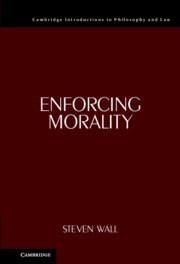Book contents
- Enforcing Morality
- Cambridge Introductions to Philosophy and Law
- Enforcing Morality
- Copyright page
- Contents
- Acknowledgments
- 1 Introduction
- Part I Background Controversies
- Part II Critical Legal Moralism
- 5 Ethical Environmentalism I
- 6 Ethical Environmentalism II
- 7 The Good of Personal Liberty
- 8 Rights to Do Wrongs
- 9 Free Expression
- 10 Pragmatism and the Perils of Enforcement
- Bibliography
- Index
6 - Ethical Environmentalism II
from Part II - Critical Legal Moralism
Published online by Cambridge University Press: 03 November 2023
- Enforcing Morality
- Cambridge Introductions to Philosophy and Law
- Enforcing Morality
- Copyright page
- Contents
- Acknowledgments
- 1 Introduction
- Part I Background Controversies
- Part II Critical Legal Moralism
- 5 Ethical Environmentalism I
- 6 Ethical Environmentalism II
- 7 The Good of Personal Liberty
- 8 Rights to Do Wrongs
- 9 Free Expression
- 10 Pragmatism and the Perils of Enforcement
- Bibliography
- Index
Summary
This chapter continues the defense of ethical environmentalism by introducing the integration thesis. This thesis holds that the ethical, interpersonal and impersonally valuable dimensions of morality interlock in ways that frustrate efforts to focus exclusively on one without attending to the others. The case for ethical environmentalism would be considerably strengthened by the truth of the integration thesis. This chapter presents a series of arguments in support of the integration thesis, each of which builds on the integral connection between distributive fairness and the common good of a society. Policies and laws that at first pass do not appear to be distributive are shown to have distributive effects on the lives of those who are subject to them that merit consideration at the bar of fairness. Given the truth of the integration thesis, the chapter next argues that the project of ethical environmentalism lends substantial support to certain forms of legal paternalism, state support for impersonal goods, such as natural beauty and human excellence, and state support for the goods of tradition. The chapter concludes by relating the project of ethical environmentalism to Devlin’s thesis that a society may use the law to preserve itself.
- Type
- Chapter
- Information
- Enforcing Morality , pp. 111 - 130Publisher: Cambridge University PressPrint publication year: 2023



